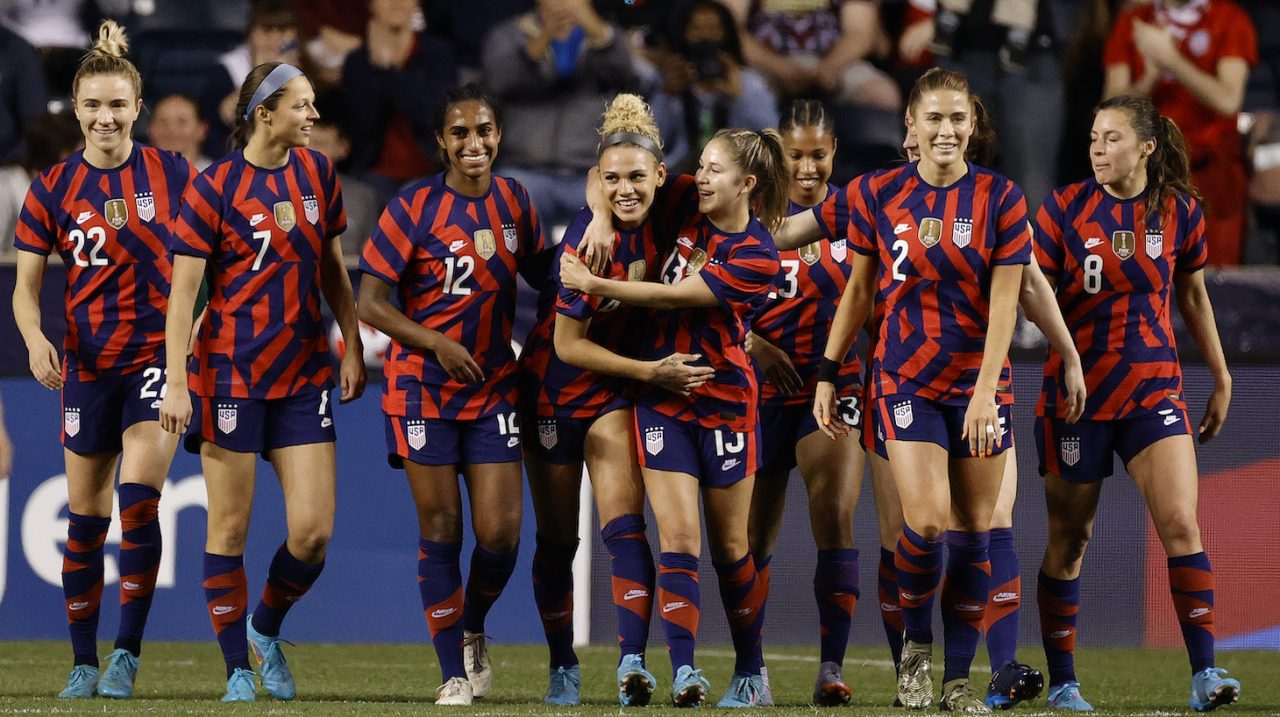Six years after filing a pay discrimination suit against U.S. Soccer, the USWNT has at last reached its goal. As announced on Wednesday, U.S. Soccer and both the men's and women's national team player associations have agreed to a new, joint collective bargaining agreement that will ensure equal compensation for members of the men's and women's teams.
The new CBA will achieve equal pay in a combination of ways. Firstly, roster and performance bonuses are now standardized across the two teams. Payment will differ depending on the nature of the match—whether it's a friendly or a tournament match, the opponent's FIFA ranking, the match's result, etc.—but the bonuses will be the same for the men and the women. Secondly, the men's and women's teams will now pool their respective earnings from the men's and women's World Cups and divide it evenly between both teams. Along with those two prongs, U.S. Soccer has agreed to a revenue-sharing split with the two teams, which will cut the players in on the federation's TV broadcast rights and other revenue sources.
Both of the two biggest aspects of the new CBA came with their own difficulties to resolve. The roster and performance bonuses on paper appeared easier to address—and indeed other countries have already standardized their bonuses across their men's and women's teams—but the particularities of the American federation's payment structure complicated the matter. Under the system governed by the old CBAs, the men were paid strictly from roster and performance bonuses while U.S. Soccer paid the women annual salaries, which included the entire salaries of the players who played for the domestic NWSL at the club level. That fundamentally different payment structure muddied some of the USWNT's equal-pay arguments from the legal side, as it made it a little harder to compare apples to oranges in terms of overall compensation. Going forward though, that will no longer be the case. (It will be interesting to see how this new structure affects the NWSL, which will no longer have U.S. Soccer there to foot the bill for many of the league's American stars.)
But the truly revolutionary aspect of the new CBA is the World Cup money. FIFA's enormously divergent prize money allotments for the men's and women's World Cups had long been the biggest impediment to the USWNT's equal-pay cause, since it's where the largest discrepancies lay. The obvious but unprecedented solution to that problem—pooling the money and divvying it up equally—is what makes today's announcement so cool.
There is equal pay as a legal matter and then there is equal pay as a broader principle. As a legal matter, the USWNT's lawsuit was always going to find it hard to realize victory, since the legal system's conception of equal pay doesn't apply very neatly to the case at hand, where men's and women's soccer are at once the same sport and completely separate sports. That was why many of the claims of the lawsuit were rejected in federal court two years ago, which initiated the out-of-court settlement talks that have resulted in today's announcement.
But the idea of equal pay for equal work is much bigger than the text of some statute in a book no one wants to read. The strength of that principle is why the USWNT overwhelmingly won over much of the American public with their struggle for equality over these past six years, and it's what convinced (and/or pressured, depending on how cynical you want to get) U.S. Soccer and the USMNT's player union to agree to the structure of this new CBA. Fighting for equal pay was a choice, not an obligation, just as it was a choice to ratify that principle in the form of this new agreement. In that way, the entire affair is a testament to the meaning of true justice, which, sometimes, when you fight hard enough for it, can be realized regardless of what some old document has to say.





